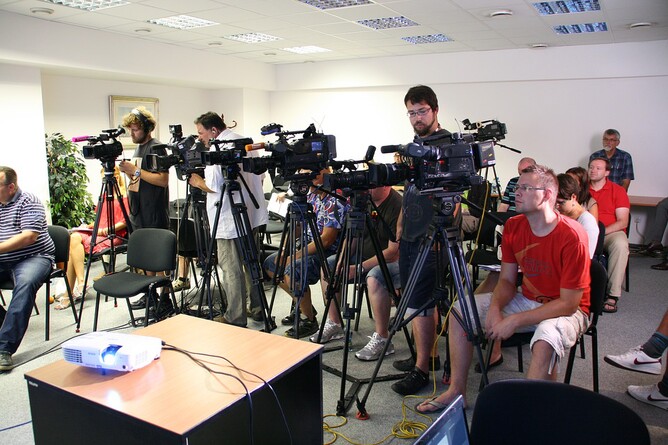By Daniel McCabe
In the last 24 hours, Donald Trump's daughter Ivanka, the same daughter he said he would be dating if she wasn't his daughter, has been stealing the headlines from her father after abruptly ending a telephone interview on Wednesday.
The interview was with Cosmopolitan magazine, not exactly a hard-hitting political publication. The Donald recently unveiled a new child-care policy which Ivanka is said to have played a leading role in.
The 34-year old has a played high profile role in her father's campaign and was promoting the new policy to the Cosmo journalist when the interview took a sour turn. When pressed on a comment her father made in 2004 about pregnancy being an inconvenience for a business, Ivanka responded:
"So I think that you have a lot of negativity in these questions…I don't know how useful it is to spend too much time with you on this if you're going to make a comment like that."
Shortly after, Ivanka pulled the pin: "I'm going to jump off," she said. "I have to run."
How to stay in control during media interviews
At Clarity, we're well versed at preparing our clients for interviews with journalists.
Media interviews hold the potential to communicate your key messages to a large audience, but as we've seen they can quickly go south if you're not prepared.
Can you ever walk out of, or cut short, an interview?
Invariably, doing so is going to be counterproductive. The consequences of cutting the interview short will far outweigh the effects of seeing the interview out. Headlines like 'such and such storms out of interview' (like we're now seeing worldwide with Ivanka) generate a huge amount of interest, and ultimately the focus is always on the interviewee losing their temper, not the journalist's potentially aggressive or invasive questioning.
There may well be occasions where you are well within your rights to end the interview, although it's not something we've ever experienced (or advised) at Clarity: we would always advise our clients to honour their media commitments in the most professional manner possible.
Being prepared, knowing what the journalist is looking for, what questions they're going to ask, is a good start to ensuring your interview goes smoothly.
The following tips will steer you on the right track.
Clarity's top tips:
1.Understand why you are being interviewed. Find out what the topic and angle of the interview will be. How will the interview be used - for a news story, a current affairs feature or an entertainment piece?
2.Be prepared. Brainstorm all of the questions you think a reporter might ask you and have responses ready. Work with someone to exhaust every possible avenue that the journalist could explore. Be prepared to answer curly questions.
3.Have a clear message, repeat it. As we said in the Tips from Bernie Sanders blog, it's imperative to have two or three main points supported by facts and stats to back up your claims. As the interview progresses it will feel more like a conversation so don't forget why you're there and go back to the key messages you want to get across, time and time again.
4.Speak clearly using language your audience understands. The language and terminology you use should be based on your audience's level of knowledge. If you're speaking to mainstream media then you need to explain concepts in ways that are easily digestible for everyone. If you're speaking to specialist media then you can pitch your message at a higher level while still being accessible to a large audience.
5.If you don't know the answer, say so, but promise to provide it in a timely manner. (Although, this doesn't excuse a lack of preparedness, à la US Libertarian presidential candidate Gary Johnson's blank expression when asked about Aleppo, Syria). While media trainers will tell you not to say 'no comment' there is nothing wrong with saying "I don't have that information at hand but I will do everything in my power to provide you with it as soon as possible".
6.Understand the journalist is not your audience. Always keep it in your mind that the reason you are doing this is to reach your audience. Regardless of the tone of the questions or how aggressive you feel the journalist is being, just keep picturing your audience. If you lose your cool and snap at a question, that is all your audience is going to see. Journalists hold the power to edit an interview in the way that best suits their story, remember that.
7.Don't storm out.
What journalists want:
Good 'talent'. This means delivering short, sharp, interesting and memorable quotes. (Incidentally, if you storm out, you have become good talent' – you've made their day!)
Perspective. Why is what you're saying relevant to wider issues currently taking place. Provide evidence that your message is on trend with what's important at present.
Supplementary information. If you can provide the reporter with additional information, statistics or a summary of your main points it will certainly aid your cause.
The interview was with Cosmopolitan magazine, not exactly a hard-hitting political publication. The Donald recently unveiled a new child-care policy which Ivanka is said to have played a leading role in.
The 34-year old has a played high profile role in her father's campaign and was promoting the new policy to the Cosmo journalist when the interview took a sour turn. When pressed on a comment her father made in 2004 about pregnancy being an inconvenience for a business, Ivanka responded:
"So I think that you have a lot of negativity in these questions…I don't know how useful it is to spend too much time with you on this if you're going to make a comment like that."
Shortly after, Ivanka pulled the pin: "I'm going to jump off," she said. "I have to run."
How to stay in control during media interviews
At Clarity, we're well versed at preparing our clients for interviews with journalists.
Media interviews hold the potential to communicate your key messages to a large audience, but as we've seen they can quickly go south if you're not prepared.
Can you ever walk out of, or cut short, an interview?
Invariably, doing so is going to be counterproductive. The consequences of cutting the interview short will far outweigh the effects of seeing the interview out. Headlines like 'such and such storms out of interview' (like we're now seeing worldwide with Ivanka) generate a huge amount of interest, and ultimately the focus is always on the interviewee losing their temper, not the journalist's potentially aggressive or invasive questioning.
There may well be occasions where you are well within your rights to end the interview, although it's not something we've ever experienced (or advised) at Clarity: we would always advise our clients to honour their media commitments in the most professional manner possible.
Being prepared, knowing what the journalist is looking for, what questions they're going to ask, is a good start to ensuring your interview goes smoothly.
The following tips will steer you on the right track.
Clarity's top tips:
1.Understand why you are being interviewed. Find out what the topic and angle of the interview will be. How will the interview be used - for a news story, a current affairs feature or an entertainment piece?
2.Be prepared. Brainstorm all of the questions you think a reporter might ask you and have responses ready. Work with someone to exhaust every possible avenue that the journalist could explore. Be prepared to answer curly questions.
3.Have a clear message, repeat it. As we said in the Tips from Bernie Sanders blog, it's imperative to have two or three main points supported by facts and stats to back up your claims. As the interview progresses it will feel more like a conversation so don't forget why you're there and go back to the key messages you want to get across, time and time again.
4.Speak clearly using language your audience understands. The language and terminology you use should be based on your audience's level of knowledge. If you're speaking to mainstream media then you need to explain concepts in ways that are easily digestible for everyone. If you're speaking to specialist media then you can pitch your message at a higher level while still being accessible to a large audience.
5.If you don't know the answer, say so, but promise to provide it in a timely manner. (Although, this doesn't excuse a lack of preparedness, à la US Libertarian presidential candidate Gary Johnson's blank expression when asked about Aleppo, Syria). While media trainers will tell you not to say 'no comment' there is nothing wrong with saying "I don't have that information at hand but I will do everything in my power to provide you with it as soon as possible".
6.Understand the journalist is not your audience. Always keep it in your mind that the reason you are doing this is to reach your audience. Regardless of the tone of the questions or how aggressive you feel the journalist is being, just keep picturing your audience. If you lose your cool and snap at a question, that is all your audience is going to see. Journalists hold the power to edit an interview in the way that best suits their story, remember that.
7.Don't storm out.
What journalists want:
Good 'talent'. This means delivering short, sharp, interesting and memorable quotes. (Incidentally, if you storm out, you have become good talent' – you've made their day!)
Perspective. Why is what you're saying relevant to wider issues currently taking place. Provide evidence that your message is on trend with what's important at present.
Supplementary information. If you can provide the reporter with additional information, statistics or a summary of your main points it will certainly aid your cause.
Top interview blow-ups and walkouts!
Paris Hilton is, like, so totally over it...
Quentin Tarantino meltdown – "I'm shutting your butt down"
American football quarterback Jim Everett's table flip!
Robert Downey Jr's had enough

